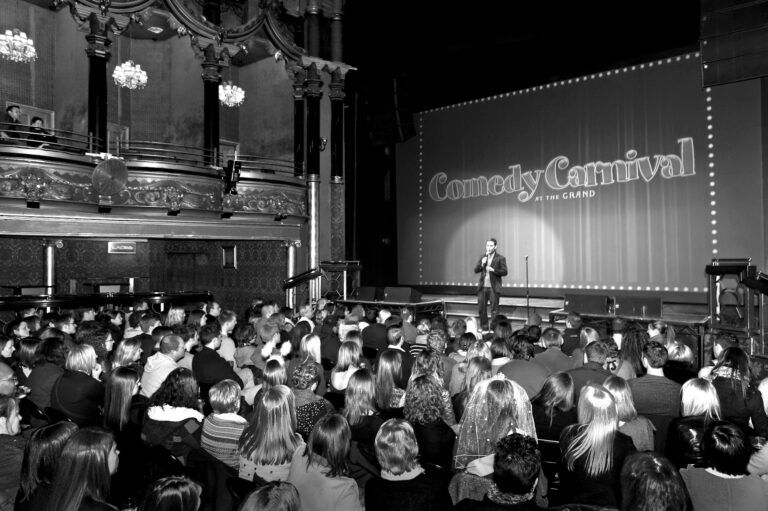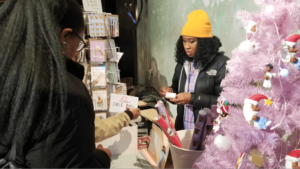Every year in big cities like London, there are dozens of new comedy nights that start up and disappear. Organising a comedy event is only half the challenge. What separates a successful event from the ones that come and go is attendance, and good attendance comes down to promotion.
Event promotion is marketing at its most basic level – it’s about letting the people who might be interested in your event, know about the event. The key question you should ask is where do these people look to find comedy nights they may be interested in?
1. Get your event listed
Years ago, people looked for events in magazines like Time Out and newspaper supplements such as the Guardian Guide. It still helps to have your event listed in printed media like this, but what you really need to do is get your event if front of the right people online.
Start with some initial research to see which guides other comedy nights are listed on. Trying to get on every online guide could be time consuming, so pick the guides which are most relevant for your type of comedy event and your event’s location.
Before you begin listing your event, it’s helpful to write a brief description of it. Have this handy to cut and paste while adding your listings, so your listings will be consistent across guides.
Online entertainment guides will ask you for some basic information when listing your show – where, when, what price and how to get tickets. The last question is crucial – how can people buy tickets to your event?
2. Create a mobile-friendly website
In the late naughties, the UK’s live comedy scene contracted, with many regular comedy nights closing and people blaming the recession. But the recession wasn’t the only reason. Some established comedy nights failed to adapt and change with the times. Emerging comedy nights focussed their efforts on having good, easy to use websites and selling tickets online.
People got tired of queuing for a comedy event that may or may not have tickets when they eventually got to the door. Advance booking allows people to be sure of their night out and to avoid spending time queuing for nothing.
Nowadays, having a basic website that tells people all about your comedy event is fundamental. People interested in your event will want to visit your website to confirm things such as dates, times, prices and how to get there.
With more people accessing the internet via their mobile devices than desktops or laptops, your website should be mobile-friendly. If you don’t know much about designing a website, you can use an online template service like Squarespace or Wix to put together a website that looks reasonably professional and works well on mobile devices. These template services are mostly based on WordPress, so you won’t need to learn anything technical and can log on and edit the website whenever you want.
3. Sell tickets online
When designing your events’ website, keep in mind how people will use it. If consumers find something they like online, quite often they are prepared to buy it there and then, so why not sell tickets online?
Reserving tickets and buying tickets are not the same thing. People who reserve tickets haven’t committed anything and may not turn up to your event. Selling tickets in advance online also comes with the advantage of knowing if your event is likely to be busy or not.
Most businesses who sell tickets online do so by using an online ticketing platform such as Eventbrite or Ticketmaster. Setting up your event tickets on these services is easy and you can then integrate the ticketing links into your website. Ticketing platforms will charge you a service fee, which varies, and you will need to decide whether you incorporate these into you ticket price or have them added as ‘booking fees’.
Be aware that not all ticketing platforms automatically allow you to download your ticket buyer’s email addresses. If your events are going to be regular, then collecting this data is very important for future promotion, so make sure to discuss this with the ticketing agent before committing to them.
4. Social media
This is a good free option if you can manage to generate some interest. Set up a Facebook page for your event and invite people to like it. Follow people on Twitter with similar interest that are likely to follow you back.
Post regularly as your event approaches and try to engage your potential audience with content related to the event, such as videos of the performers or interviews with them. Share to your own social media accounts and tag the venue and comedians, so they’re more likely to share the posts as well. On some ticketing platforms, you can even sell tickets directly from the Facebook app so you can turn your online audience directly into ticket buyers.
5. Advertise online
This space is currently dominated by two players – Google AdWords and Facebook Ads. Both can make a big difference to the success of your event if done correctly. If done badly, they can quickly drain your budget with little results. Your goal should be to get clicks on your ads that result in ticket sales, which are called conversions.
One thing I would advise with online advertising is to set a budget and stick to it. Plan your online advertising so that it starts several weeks before your event and calculate what your daily budget is. You don’t have to advertise all the time, so if your budget is restricted, pick specific days of the week or hours of the day to advertise.
Start off with several versions of your ad, by varying the images and text. Monitor the ads’ performance over time and then remove the worst performing ads (the ones with lowest click-through rates). This will concentrate your budget on ads more likely to result in conversions.
Think about your website’s ‘landing page’ for your ads. A good user experience takes someone from potential buyer to ticket buyer with as few clicks as possible.
6. Promote your event locally
If you have a small budget which doesn’t allow for online advertising, traditional advertising using posters and flyers can generate interest amongst the local community. Printed materials are quite cheap in quantity, and most online printing services offer design services as well.
Start with the venue hosting your event. If they haven’t already asked you for posters and flyers, ask them how many they’d like and once they arrive, supervise the placement yourself. You ideally want your posters in a prominent window and your flyers where customers are likely to take them, like the bar area.
Walk around to local businesses and talk to them about your event. Have your posters ready and ask if you can put one in their window. Use free tickets to your event to persuade anyone that seems reluctant.
7. Write a press release
Lastly, if your event is new, unique or for a special cause then you have something to tell the press. Write a press release to send to journalists and editors, giving some background on why you started the event and what you hope to achieve. Try and keep it to one page and remember to state the event’s details and where to buy tickets at the end.
In conclusion
Promoting a comedy event is all about getting the word out to the right people. There are lots of options for promotion online and locally, so choose the ones which maximise your time and budget to reach the most people in your target audience. Free options like entertainment listings and social media are a good place to start, so plan ahead and get the word out as far and as wide as you can.




